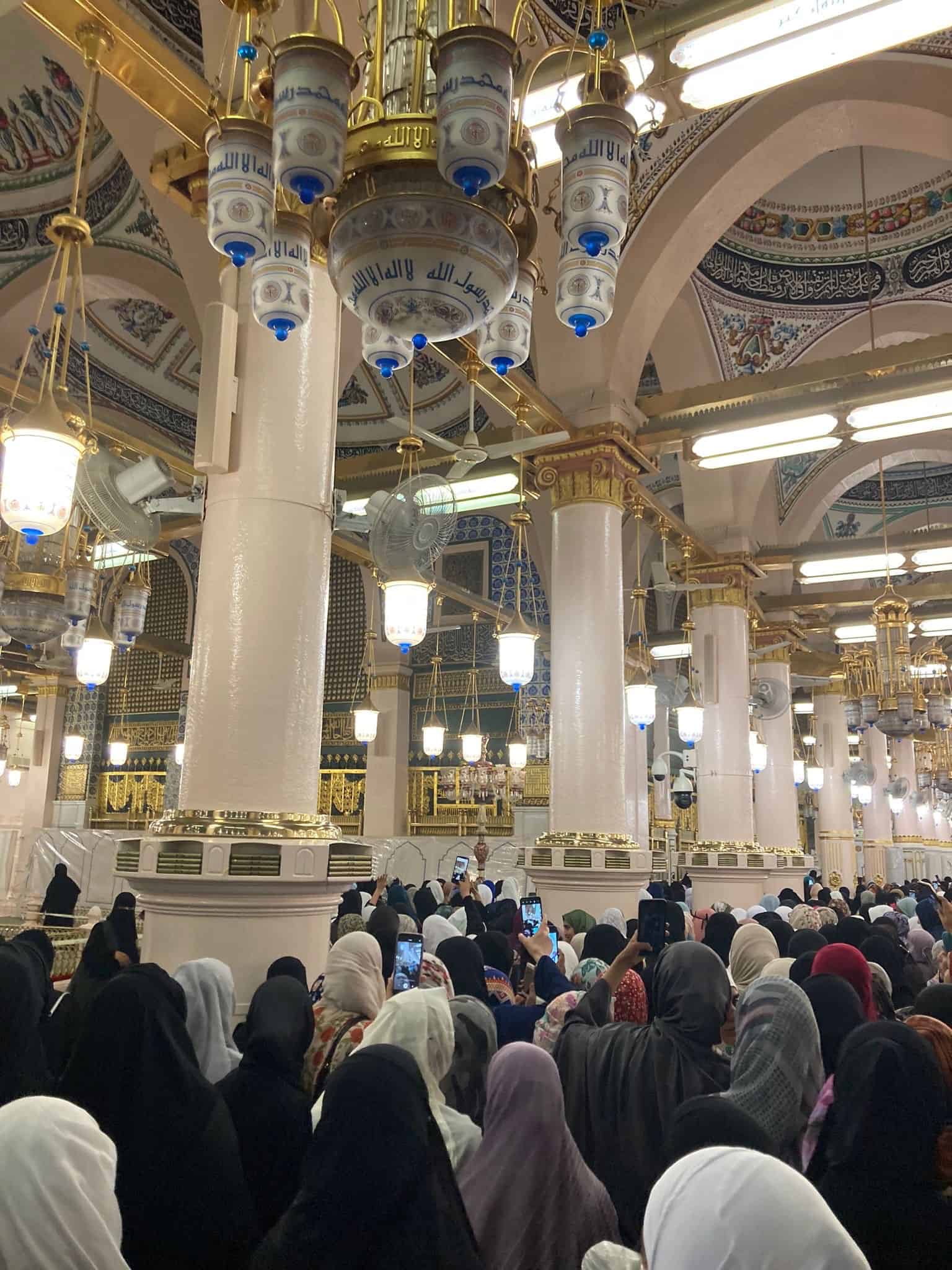Good character is the elevator that takes you to the top floor in Jannah

After the very first revelation, Allah Almighty addressed the Prophet (peace be upon him) and told him he had the best character:
وَإِنَّكَ لَعَلَىٰ خُلُقٍ عَظِيمٍۢ ٤
And you are surely on an excellent standard of character. [68:4]
لَقَدْ كَانَ لَكُمْ فِي رَسُولِ اللَّهِ أُسْوَةٌ حَسَنَةٌ لِمَنْ كَانَ يَرْجُو اللَّهَ وَالْيَوْمَ الْآخِرَ وَذَكَرَ اللَّهَ كَثِيرًا
Verily, you have in the Prophet of Allah an excellent model, for him who hopes to meet Allah and the Last Day and who remembers Allah much. (33:21)
The first revelation was iqra, ‘Read’ is significant because it shows that our religion is based on knowledge. It is a strong religion because it is not just based on knowledge but sacred knowledge. We are the only Ummah who have preserved this sacred knowledge in a perfect manner. No other Ummah has preserved their sacred knowledge as us.
The second revelation shows the importance of character and also that the Prophet (peace be upon him), our role model, had the best character. Ibn Ashur (may Allah be pleased with him) commented in depth on this saying that the definition of good character is dealing with people with kindness under every circumstance. No matter what the situation, be the best in how you deal with them. Not like the weather – dull, overcast and cloudy some days and bright and chirpy on others. As Muslims, we should be unfailingly pleasant, polite, optimistic and cheerful.
The are many narrations that encourage believers to behave with good character. The Prophet (peace be upon him) said:
قال ـ صلى الله عليه وسلم ـ : ( خياركم أحاسنكم أخلاقا ) رواه مسلم
The best amongst you are those who are best in character. [Muslim]
In another narration, he said:
وقال: ( إن من أحبكم إليّ أحسنَكم أخلاقا ) رواه البخاري .
The most beloved to me amongst you is the one who has the best character and manners. [Bukhari]
It’s very simple: of you want to be among those who are the closest to the Prophet (peace be upon him) in Paradise, you need to have good character.
Jabir bin ‘Abdullah (may Allah be pleased with them) said that the Messenger of Allah (peace be upon him) said,
وعن جابر بن عبد الله رضي الله عنهما أن رسول الله صلى الله عليه وسلم قال: “إن من أحبكم إلي، وأقربكم مني مجلسًا يوم القيامة، أحاسنكم أخلاقًا، وإن أبغضكم إلي وأبعدكم مني يوم القيامة، والثرثارون، والمتشدقون، والمتفيهقون”.
“The dearest and the closest of you to me on the Day of Resurrection will be those who are the best in behaviour; and the most hateful and the farthest from me on the Day of Resurrection will be the talkative and the most pretentious and the most rhetorical.” [Tirmidhi]
Demonstrating good character
Allah Almighty sent the Prophet (peace be upon him) to us so he could show us exactly what good character looked like. The way in which he dealt with people and situations shows us how to behave. If we want to be the best version of ourselves, we look to him (peace be upon him).
Abu Hurayrah (may Allah be pleased with him) narrated that the Prophet (peace be upon him) said:
عن أبي هريرة رضي الله تعالى عنه قال قال رسول الله صلّى الله عليه وسلم:
“إنما بُعِثتُ لأُتَمِّمَ صالِحَ الأخْلاقِ “.
“I was only sent to complete the noble character.” (Musnad Ahmad)
If we look at the wording of this hadith, we see that the Prophet (peace be upon him) was sent to ‘complete’ or ‘perfect’ good character. This is because the Arabs to whom he was sent, were not devoid of good character traits. Rather they still possessed some of the virtues of good character from the teachings of Ibrahim (peace be upon him). However, they had deviated into disbelief in many aspects. Therefore, the Prophet (peace be upon him) was sent to show them how to improve themselves and attain the best character, which is the character of the revelation.
How do you rate your character?
There are several traits that are part of having good character. How well are you at:
• Actively seeking to reconcile between people.
• Speaking sparingly but acting generously.
• Being obedient and respectful to one’s parents.
• Showing patience in the face of adversity.
• Expressing gratitude to Allah and accepting His decree.
• Practicing gentleness, empathy, and compassion.
• Avoiding cursing, slander, gossip, impatience, miserliness, and envy.
• Being cheerful and spreading positivity among others.
• Loving for the sake of Allah, being content with His decisions, and becoming angry for His sake.
Be tolerant of others and have good manners
Having good character begins with behaving well with everyone. The Prophet (peace be upon him) said:
وخالق الناس بخلق حسن” ((رواه الترمذي
and behave decently towards people. [Tirmidhi]
When his companions asked him to explain how to behave well, he said the first thing was to have good manners and to tolerate people. To tolerate people means to accept their differences, and their different opinions, their behaviour, and their actions even if you may not agree with or approve of them. It means showing patience, respect, and understanding, unless their choices cause harm to others or infringe upon their rights. It is an essential component of a harmonious and diverse society.
Al-Munawi, in Fayd al-Qadir, commented having good character means to engage with them in a courteous manner, such as speaking gently, being patient, showing compassion, being humble, not assuming ill of them, being kind to both the elderly and the young, and being considerate in dealing with their diverse temperaments.
Ibn Rajab in Jami’ al-Ulum wa al-Hikam said: Good character includes generosity, giving, and patience.
In the explanation of the Forty Hadith by al-Nawawi, it is stated: His saying, ‘and treat people with good character,’ means treat people in the way you would like to be treated.
Do not harm anyone
The second aspect of good character is not to harm anyone. The Prophet (peace be upon him) gave Abu Hurayrah a great piece of advice, saying:
‘O Abu Hurayah! You should possess good character.’ Abu Hurayrah asked, ‘What is good character, O Messenger of Allah?’ The Prophet replied: ‘It is to maintain ties with those who cut you off, to forgive those who wrong you, and to give to those who withhold from you.’ [Bayhaqi]
Good character is a trait of the prophets, messengers, and the best of believers. They do not respond to evil with evil; rather, they pardon, forgive, and respond to ill-treatment with kindness.
In another narration Prophet Muhammad (peace be upon him) said,
“Do not harm others, and do not reciprocate harm for harm.” (Ibn Majah)
Have a cheerful face
The third aspect of having good character is having a cheerful face and pleasant demeanour. The Prophet (peace be upon him) was ‘daiman bishr’ always smiling. He did not dismiss smiling as insignificant. On the contrary he said:
“Do not belittle any act of kindness, even if it is just greeting your brother with a cheerful face.” (Muslim)
Al-Sha’bi said: Good character consists of generosity, giving, and a cheerful countenance. Ibn al-Mubarak said: It is having a cheerful face, performing acts of kindness, and refraining from harm.”
Say what is good
Prophet Muhammad (peace be upon him) also emphasised the importance of speaking positively and truthfully, stating,
“Speak good or remain silent.” (Bukhari and Muslim)
Be forgiving and not carry grudges
The Prophet (peace be upon him) taught the importance of forgiveness and letting go of grudges, saying,
“Show mercy, and you will be shown mercy; forgive, and Allah will forgive you.” (Tirmidhi)
Be generous
Generosity is one of the aspects of good character. It is not something one shows when they are wealthy, but at all times and in all circumstances.
“Remember the words of Allah, the Most High: ‘Those who spend [in the cause of Allah] in ease and hardship and who restrain [their] anger and pardon the people – and Allah loves the doers of good.’ (3:134).
It is important to know that one of the heaviest things placed on the scale on the Day of Judgment is good character.
Good character (husn al-khuluq) was demonstrated in lives of all the prophets, as well as by the truthful (siddiqeen), and the righteous (salihin).
Good character is one of the attributes of the prophets, the truthful, and the righteous. Through it, individuals attain higher ranks and elevated status. Allah, the Most High, distinguished His Prophet Muhammad (peace be upon him) with the collection of praiseworthy character traits and beautiful manners.
Aisha (may Allah be pleased with her) said:
‘No one had better character than the Messenger of Allah, peace be upon him. Whenever someone called upon him from his Companions or family, he would say, ‘Labbaik’ (I am at your service). That’s why Allah, the Mighty and Majestic, revealed the verse: ‘And indeed, you are of a great moral character.’ (68:4)
Good character is a means of drawing closer to Allah and earning His pleasure. It is an elevator that takes your right up to the highest floor of Jannah.
The Prophet (peace be on him) did not just have the best character, but would supplicate for good character, thus teaching us to ask for it:
اللَّهُمَّ اهْدِنِي لأَحْسَنِ الأَعْمَالِ وَأَحْسَنِ الأَخْلاَقِ لاَ يَهْدِي لأَحْسَنِهَا إِلاَّ أَنْتَ. رواه النَّسائي
O Allah, guide me to the best of deeds and the best of character, for none can guide to the best of them but You. (Nasa’i)
May Allah Almighty make us from those who exemplify the best character and make the Prophet (peace be upon him) proud of his Ummah. Ameen
- Inspirational women in Islam
- The forces of Allah and the fate of the falsifiers
- Climbing the stairs: How to continue your spiritual journey post-Ramadan
- How Allah strengthens the hearts of believers
- Why should you follow up one good action with another one?
Shaykh Haytham Tamim – Khutbah 29th Sept 2023
How to deal with difficult neighbours
Ghazali’s 20 rules for dealing with people
The social code for a building a harmonious society
- Inspirational women in Islam
- The forces of Allah and the fate of the falsifiers
- Climbing the stairs: How to continue your spiritual journey post-Ramadan
- How Allah strengthens the hearts of believers
- Why should you follow up one good action with another one?
Recommended Posts

Inspirational women in Islam
May 01, 2024

The forces of Allah and the fate of the falsifiers
April 26, 2024

How Allah strengthens the hearts of believers
April 19, 2024
